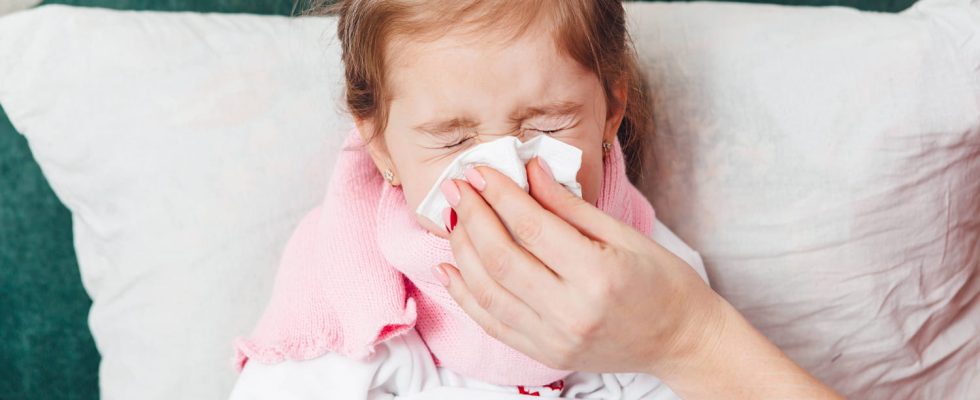Does your baby have a stuffy nose and difficulty breathing, especially at night? There are natural treatments and solutions to help your baby breathe better.
You feel like your child has a cold all winter? Before 2 years, the little ones can present about ten colds a year. Most of the time, the common cold starts with a stuffy and runny nose. The baby’s nose may be particularly clogged at night. How relieve the baby with a stuffy nose? How unclog naturally an infant’s nose? When to worry?
Usually a cold starts with sneezing and the nose starts running a lot. “As in all seasonal viral infections, the child may be slightly febrileit can also have sore throat (this is inflammation of the pharynx: pharyngitis) and be a bit grumpy. Over the days, the secretions (transparent at first) change appearance and can become purulent“ details Dr. Fabienne Kochert, pediatrician in Orleans and president of the French Association of Ambulatory Pediatrics. Because of his stuffy nose, the baby may be embarrassed to drink his bottle or sleep.
Small infants cannot breathe through their mouths, so unclog the nostrils as often as necessary: nose wash with saline preferably (a few drops in each nostril are often sufficient for the child to be relieved), a Baby Fly (to be used gently) can be useful. “None of the nasal hygiene solutions sold in pharmacies has shown superior efficacy to that of physiological saline. It is possible to use a seawater spray (Stérimar ® type)” replies Dr. Kochert. Care must be taken to hydrate well small infants: give to drink often, split meals if necessary. The administration of paracetamol may be recommended to improve your child’s comfort and/or in the event of a poorly tolerated fever, pending medical advice.
To help your baby get a good night’s sleep, the pediatrician advises: “Ventilate the room well morning and evening, no comforters in bed, sleeping on a firm mattress and do not overheat bedroom.”
► Essential oils. “Essential oils are contraindicated in children under 6 years of age, recalls pharmacist Tina Gereral. Overall, essential oils and plants are not recommended except in very low doses and in certain products applied to the skin (Gel PranaBB Baume Respiratoire® for example). It is a formula based on noble chamomile, balsam fir, black spruce, shell marjoram and fragrant inula, 100% organic essential oils with a Madagascar vanilla scent. This can be used from the age of 3 months.
Caution in infants: “It is essential avoid products containing camphor, menthol, Armenia paper and other incense because they release volatile organic compounds such as benzene, formaldehyde, toluene which are very toxic and irritating especially in the little ones” insists our interlocutor.
► From sulfur and trace elements. “Some ENT doctors prescribe 3-month cures based on sulfur combined with vitamin A and trace elements such as manganese, copper, and the copper/gold/silver trio. Obviously, the nose must also be cleaned with physiological serum” recalls Tina Gereral.
► Homeopathy. Against the blocked nose and the discomfort to suckle, there is Sambucus nigra 9 CH : 3 pellets before each meal. To administer homeopathy to a toddlersimply dilute the granules in a small 50 ml bottle of water, for example, which will be given 5 or 6 times during the day, rather before the meal. The bottle must be kept in the refrigerator between each dose.
When to worry about a stuffy nose in babies?
“Before 3 monthsit is recommended to consult if your child is in poor general condition (high fever, poorly colored, pale) and/or if he has an unusual behavior: trouble breathing, he does not eat” rrecommends Dr. Kochert. For a larger baby, it is better to consult a doctor in case of wheezing or in the presence of a complication.
To avoid the spread of microbes as much as possible, the best way remains to wash hands with liquid soap. “In case of rhinitis: throw away tissues after use, cover your mouth when you cough and teach your child to do the same”, advise the pediatrician.
► Avoid going to public placess with small infants during epidemics.
► Do not smoke in the presence of your child.
► Ventilate regularly your interior.
Thanks to Dr Fabienne Kochert, pediatrician in Orléans and president of the French Association of Ambulatory Pediatrics (Affa) and pharmacist Tina Gereral.
